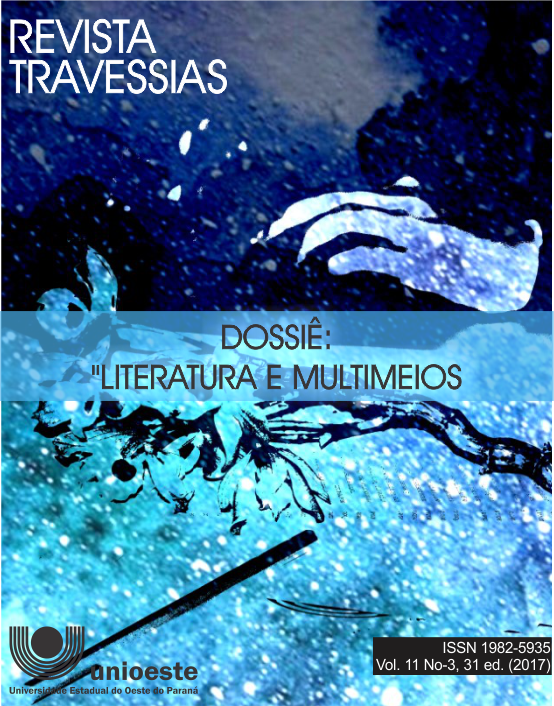The movie Nome Próprio, by Murilo Salles: post-modernity and the confluence between the internet, literature and cinema
Keywords:
Post-modernity, Cinema, Internet, Hybridism.Abstract
The confluences between cinema and literature have increasingly awakened the hybridization of these two art forms which united, manage to enhance their meanings and interpretations. This movie is an adaptation inspired by the novel Máquina de Pinbal by Clarah Averbuck, published in 2002. This romance was born from the reflections from the blog of the same author and culminated finally in the cinema with Nome Próprio (2007). Under the direction of Murilo Salles, it is an example that the cinema has been approaching more and more of the universe of the writing and vice versa. The feature film features the character Camila, blogger, subversive and existentialist, the young woman faces various anguish and psychological conflicts mixed with her compulsive need for writing and reading. Stubborn for writing a book and, therefore, build her life, the protagonist is the representation of the writer who hopes that his literature transforms his own history. In the book, Camila is an alter ego of the author herself and features enhanced in the adaptation to the cinema. This article aims to list the hybrid elements present in the works, their intersections, distances and analyze the way in which the written text was reinvented in the filmic construction, having as its main part, Camila. To do so, we will consult the bibliography that supports Bauman's theory of postmodern condition, Sartre's existentialism, and the connections between cinema and literature present in the adaptation beyond the considerations arising from the cybernetic era.
Downloads
References
AVERBUCK, Clarah. Máquina de Pinball. São Paulo: Conrad Editora do Brasil, 2002.
BAUMAN, Zygmunt. Amor líquido. São Paulo: Zahar, 2011.
BAUMAN, Zygmunt. 44 cartas do mundo líquido moderno. São Paulo: Zahar, 2011.
BENJAMIN, Walter. Origem do drama barroco alemão. Tradução: Sergio Paulo Rouanet. São Paulo: Editora Brasiliense, 1984.
CARRIÈRE, Jean-Claude. A linguagem secreta do cinema. Edição especial. Rio de Janeiro: Nova Fronteira, 2015.
GOMES, Paulo Emilio Salles et al. A personagem cinematográfica in A personagem de ficção. São Paulo: Editora Perspectiva, 1964.
HUTCHEON, Linda. Uma teoria da adaptação. Florianópolis: Editora UFSC, 2013.
MCHULAN, Marshall. Os meios de comunicação como extensões do homem. Tradução Décio Pignatari. São Paulo: Editora Cultrix, 1964.
NOME Próprio. Direção de Murilo Sales. 2007. (120 min.), son., color.
PALFREY, John. Nascidos na era digital. Entendendo a primeira geração de nativos digitais. Porto Alegre: Grupo A, 2011.
SANTOS, Jair Ferreira dos. O que é pós-moderno. São Paulo: Brasiliense, 2004.
SARTRE, Jean-Paul. O existencialismo é um humanismo. Rio de Janeiro: Vozes, 1996.
STAM, Robert. Introdução à teoria do cinema. 5ª edição. São Paulo: Papirus Editora, 2013.
Downloads
Published
How to Cite
Issue
Section
License
Creative Copyright Notice
Policy for Free Access Journals
Authors who publish in this journal agree to the following terms:
1. Authors keep the copyright and grant the journal the right of first publication, with the work simultaneously licensed under the Creative Commons Attribution License, which allows sharing the trial with acknowledgment of authorship and initial publication in this journal.
2. Authors are authorized to take additional contracts separately, for non-exclusive distribution of the work version, published in this journal (eg publish in institutional repository or as a book chapter), with acknowledgment of authorship and initial publication in this journal.
3. Authors are allowed and encouraged to publish and distribute their work online (eg in institutional repositories or on their personal page) at any point before or during the editorial process, as this can generate productive changes, as well as increase both impact and citation of the published trial (See The Effect of Free Access).
Creative Commons License
This work is licensed under a Creative Commons Attribution–NonCommercial-shareaswell 4.0 International License, which allows you to share, copy, distribute, display, reproduce, completely or part of the work, since there is no commercial purpose, and authors and source are cited.



